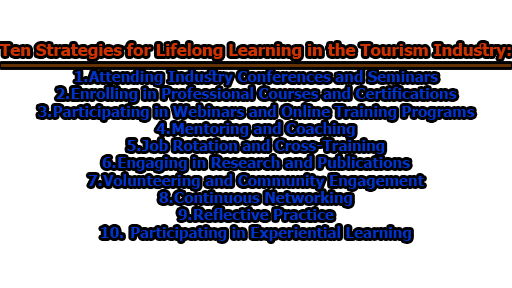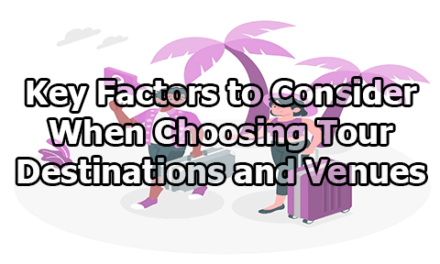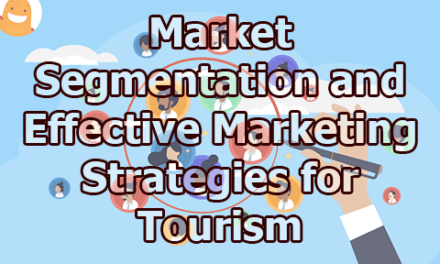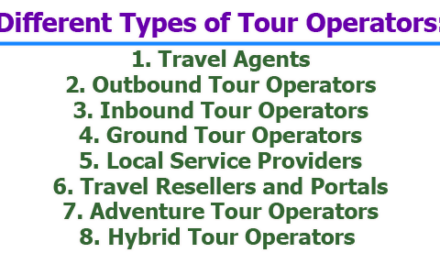Tourism is one of the fastest-growing industries globally, and it is continuously evolving with new technologies, innovations, and market trends. To keep up with the changes and stay competitive in the industry, professionals in the tourism sector must engage in lifelong learning. Lifelong learning refers to the continuous development of knowledge and skills throughout an individual’s life. In this article, we will explore the ten strategies for lifelong learning in the tourism industry and their significance.
Importance of Lifelong Learning in Tourism:
Lifelong learning is essential in the tourism industry due to the following reasons:
- Stay Competitive: The tourism industry is highly competitive, and professionals must continuously update their knowledge and skills to remain competitive in the market.
- Adapt to Technological Advancements: With the fast pace of technological advancements, tourism professionals must continually adapt to new innovations to meet customer expectations.
- Increased Job Opportunities: Lifelong learning helps individuals acquire new knowledge and skills, making them more employable and eligible for promotions.
- Improved Customer Experience: Lifelong learning equips tourism professionals with new insights, enabling them to offer better services and improve customer satisfaction.
- Stay Relevant: Tourism is an industry that is continuously evolving with new market trends, and lifelong learning helps professionals stay relevant and up-to-date with industry developments.
- Enhanced Professional Growth: Lifelong learning allows professionals to enhance their professional growth by acquiring new skills and knowledge, leading to personal satisfaction and fulfillment.
- Better Decision-Making: Lifelong learning equips professionals with the necessary skills and knowledge to make informed decisions that can positively impact their organizations.
- Boost Productivity: Lifelong learning enables professionals to be more productive in their roles, leading to increased efficiency and effectiveness in their operations.
- Fosters Innovation: Lifelong learning inspires professionals to think critically, leading to innovation and the development of new solutions that can benefit their organizations and the industry as a whole.
- Contributes to Industry Growth: Lifelong learning allows professionals to contribute to the growth and development of the tourism industry by sharing their knowledge, ideas, and insights with their peers and the broader community.
Ten Strategies for Lifelong Learning in the Tourism Industry:
Here are ten strategies for lifelong learning in the tourism industry:
1. Attending Industry Conferences and Seminars: Attending industry conferences and seminars is an effective way of staying updated with new market trends, industry innovations, and advancements. These events offer a platform for networking, learning from experts, and sharing ideas with peers. By attending such events, professionals can gain new knowledge, insights and apply them in their operations.
2. Enrolling in Professional Courses and Certifications: Professionals in the tourism industry can acquire new skills and knowledge by enrolling in professional courses and certifications. Such courses offer specialized training on various topics, including hospitality management, customer service, digital marketing, and revenue management. By acquiring certifications, individuals demonstrate their competence and commitment to their profession, making them more attractive to potential employers.
3. Participating in Webinars and Online Training Programs: With the rise of digital technologies, online training programs, and webinars have become a popular way of accessing learning materials. These programs offer flexibility and convenience as learners can access them from anywhere, anytime. Online training programs cover various topics, including customer service, digital marketing, revenue management, and sustainability. By participating in such programs, tourism professionals can stay updated with industry developments and acquire new skills.
4. Mentoring and Coaching: Mentoring and coaching programs offer an opportunity for professionals to learn from experienced mentors and coaches. Mentors offer guidance, support, and insights on various topics, including career development, leadership, and personal growth. Coaching, on the other hand, is a more structured program that focuses on specific skills or competencies. By participating in mentoring and coaching programs, professionals can gain new perspectives, learn from experienced mentors and coaches, and apply the insights in their operations.
5. Job Rotation and Cross-Training: Job rotation and cross-training programs offer an opportunity for professionals to learn new skills and gain experience in different departments. By rotating to different departments, professionals gain new insights into the organization’s operations and develop a broader understanding of the tourism industry. Cross-training programs equip professionals with multiple skills, making them more versatile and eligible for promotions.
6. Engaging in Research and Publications: Engaging in research and publications is an effective way of staying updated with the latest developments in the tourism industry. Professionals can conduct research on various topics, including customer preferences, market trends, and sustainability. By publishing their research, they contribute to the industry’s knowledge base and establish themselves as thought leaders.
7. Volunteering and Community Engagement: Volunteering and community engagement offer an opportunity for professionals to give back to society and acquire new skills. By volunteering in community projects, professionals gain new insights, develop teamwork skills, and improve their communication skills. Community engagement also helps professionals establish a positive reputation in their communities, which can lead to new business opportunities.
8. Continuous Networking: Networking is a crucial aspect of lifelong learning in the tourism industry. Professionals must continuously engage with their peers, industry experts, and potential clients to stay updated with industry developments and acquire new business opportunities. Networking can be done by attending industry events, joining professional associations, and participating in online forums.
9. Reflective Practice: Reflective practice is the process of reflecting on one’s experiences and learning from them. Professionals can engage in reflective practice by regularly reviewing their operations, identifying areas for improvement, and developing strategies to enhance their skills and knowledge. Reflective practice helps professionals gain a deeper understanding of their work and develop a growth mindset.
10. Participating in Experiential Learning: Experiential learning involves learning by doing. Professionals can engage in experiential learning by participating in on-the-job training, internships, and apprenticeships. By participating in such programs, professionals gain practical experience, acquire new skills, and develop a deeper understanding of the tourism industry.
It is apparent that lifelong learning is essential for professionals in the tourism industry to stay updated with industry developments and remain competitive in the market. The strategies outlined in this paper offer a range of options for professionals to acquire new skills and knowledge continuously. From attending industry events and participating in online programs to engaging in reflective practice and experiential learning, there are many ways for tourism professionals to engage in lifelong learning. By continually updating their skills and knowledge, professionals can enhance their careers, improve their customer service, and contribute to the industry’s growth and development. It is, therefore, crucial for individuals in the tourism sector to prioritize lifelong learning to remain relevant in a constantly evolving industry.
References:
- Altbach, P.G. & Knox, A. (2014). Introduction: The Importance of Lifelong Learning. In Lifelong Learning in the Global Knowledge Economy (pp. 1-9). Sense Publishers.
- Buhalis, D. & Law, R. (2008). Progress in Information Technology and Tourism Management: 20 Years on and 10 Years After the Internet–The State of eTourism Research. Tourism Management, 29(4), 609-623.
- Dede, C. (2010). Comparing Frameworks for 21st Century Skills. In J. Bellanca & R. Brandt (Eds.), 21st Century Skills: Rethinking How Students Learn (pp. 51-76). Solution Tree Press.
- Durazo, E.M. & Rodriguez, R.S. (2017). The Importance of Lifelong Learning for a Career in Tourism: The Perspective of Experienced Professionals. Journal of Tourism and Hospitality Management, 5(2), 33-43.
- Lytras, M.D., Visvizi, A., Al-Sudairi, A. & Karwowski, W. (2018). Tourism and Information Technology: A Research Agenda for the Future. Journal of Business Research, 89, 285-288.
- Mawson, D. (2015). Lifelong Learning for Tourism Professionals. International Journal of Hospitality Management, 47, 135-143.
- Neugarten, B.L. (1977). The Future of Age. American Journal of Psychiatry, 134(9), 1005-1012.

Library Lecturer at Nurul Amin Degree College










